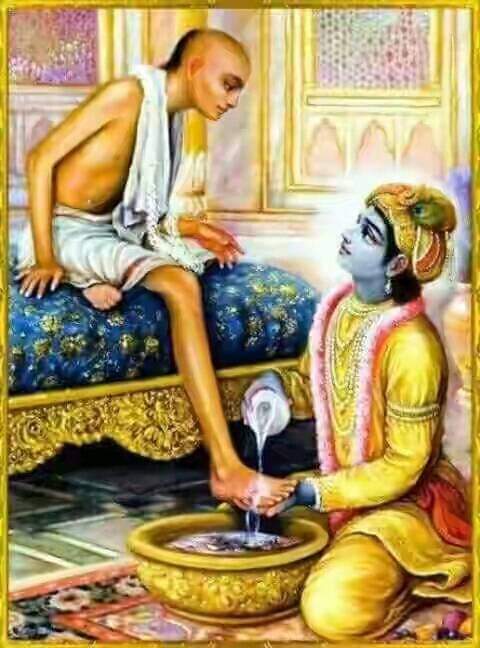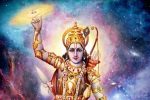NAME 82
Kṛtajñaḥ कृतज्ञः
Kṛtajña means the one who knows what is right and conducts himself in the rightful manner. Viṣṇu is always known for His righteousness. He is said to be the Lord of righteousness. He sets an example to others by following righteousness. Righteousness is nothing but religious percepts, exclusively for the purpose of Realisation.
Kṛṣṇa says in Bhagavad Gita (IV.7)
yadā yadā hi dharmasya glānirbhavati bhārata |
abhyutthānmadharmasya tadātmānaṁ sṛjāmyaham ||
यदा यदा हि धर्मस्य ग्लानिर्भवति भारत।
अभ्युत्थान्मधर्मस्य तदात्मानं सृजाम्यहम्॥
“Wherever virtues decline and immorality looms, I embody as an avatar.”
The uttarabhāgaḥ of this Sahasranāma (verse 17) says,
ācāra-prabhavo dharmo dharmasya prabhuracyutaḥ
आचार-प्रभवो धर्मो धर्मस्य प्रभुरच्युतः
This means righteousness is born out of dharma and Viṣṇu is the Lord of dharma.
Nāma 532 is also Kṛtajñaḥ.
Kritajnah – He is grateful to His devotees. Kritajnah is a person of great gratitude or one who appreciates even the smallest act of devotion and responds greatly to it.
In Bhagavad Gita, Chapter 9 Verse 26, Bhagavan says:
‘Patram pushpam phalam toyam yo me bhaktyaa prayacchati
Tadaham Bhaktyupahritam Ashnaami Prayataatmanah’
Meaning: Even if someone makes a humble offer of a leaf, a flower, a fruit or even water I take it with pleasure provided it was rendered with Bhakti. In Srimad Bhagavatam, Kuchela gives Krishna a handful of poached rice and gets a Kingdom in return.
He is ever so grateful to his devotees. He came rushing to the aid of Draupadi when she cried for help uttering “Govinda”. He lifted the Govardhana Giri to save the people and animals of Vrindavan from Indra’s fury.
Sri Parasara Bhattar refers to Chapter 9 Verse 30 of the Bhagavad Gita to emphasise his kindness:
“api cet suduraacaaro bhajate maamanaya bhaak |
saadhureva sa mantavyah samyag vyavasito hi sah ||”
If even the most sinful man worships Me with undivided devotion, with worship as the only purpose, such a person must be considered highly righteous.
Bhagavan in Chapter 18 Verse 66 of the Bhagavad Gita again shows his kaarunya bhaava by reiterating with his Charama Shloka.
“sarva-dharmān parityajya mām ekaḿ śaraṇaḿ vraja
ahaḿ tvāḿ sarva-pāpebhyo mokṣayiṣyāmi mā śucaḥ”
Setting aside all meritorious deeds (Dharma), just surrender completely to My will (with firm faith and loving contemplation). I shall liberate you from all sins and grant you Moksha. Do not fear.
Bhagavan is so grateful that the mere worship of Him with sincerity is sufficient for Him to forgive all other sins committed by the worshiper. By surrendering to Him and worshiping him one can attain liberation or Moksha from this Samsara.
Kritajnah also means someone who keeps a tab on every act of every person. In the words of Sri Adi Sankara ‘Praaninaam Punyaapunyaatmakam karma kritam Jaanaati iti Kritajnah – He is called Kritajnah because He keeps an exact account of the good and bad deeds of all beings’.
Bhagavan in Chapter 18 Verse 66
सर्वधर्मान्परित्यज्य मामेकं शरणं व्रज | अहं त्वां सर्वपापेभ्यो मोक्षयिष्यामि मा शुच: ॥66॥
sarva-dharmān parityajya mām ekaṁ śharaṇaṁ vraja ahaṁ tvāṁ sarva-pāpebhyo mokṣhayiṣhyāmi mā śhuchaḥ
Word Meanings
sarva-dharmān—all varieties of dharmas; parityajya—abandoning; mām—unto me; ekam—only; śharaṇam—take refuge; vraja—take; aham—I; tvām—you; sarva—all; pāpebhyaḥ—from sinful reactions; mokṣhayiṣhyāmi—shall liberate; mā—do not; śhuchaḥ—fear
Translation
Abandoning all forms of rites and duties, take refuge in Me alone. I shall free you from all sins. (Therefore) do not grieve.
८२. ॐ कृतज्ञाय नमः |
82. OM Kr̥tajñāya Namaḥ
Kritajnah -He who knows all that is done by all: the One Knower who knows all physical activities, all emotional feelings, and all intellectual thoughts and motives. He illumines them all, in all, at all times. Hence He is called Kritajna. Vishnu is the One who knows clearly the exact depth of sincerity, the true ardency of devotion, the real amount of purity in the bosom of all his devotees, and, accordingly, brings joy and bliss to their hearts.
Kr̥taṃ (prāṇināṃ puṇyā puṇyātmakaṃ karma) jānāti / कृतं (प्राणिनां पुण्या पुण्यात्मकं कर्म) जानाति One who knows everything about what has been done (Kr̥ta) by Jīvas. Even to those who make a small offering of leaf, flower etc., He grants Mokṣa (liberation).
Śrīmad Bhāgavata – Canto 10, Chapter 81
Kiñcitkarotvurvapi yatsvadattaṃ
Suhr̥tkr̥taṃ phalgvapi bhūrikārī,
Mayopaṇītaṃ pr̥thukaikamuṣṭiṃ
pratyagrahītprītiyuto mahātmā. (35)
:: श्रीमद्भागवते महापुराणे दशमस्कन्धे, नामैकाशीतितमोऽध्यायः ::
किञ्चित्करोत्वुर्वपि यत्स्वदत्तं
सुहृत्कृतं फल्ग्वपि भूरिकारी ।
मयोपणीतं पृथुकैकमुष्टिं
प्रत्यग्रहीत्प्रीतियुतो महात्मा ॥ ३५ ॥
The Lord considers even His greatest benedictions to be insignificant, while He magnifies even a small service rendered to Him by His devotee. Thus with pleasure the Supreme Soul accepted a single palmful of the flat rice I brought Him.
INTERPRETATION GUIDED BY SANT VANI (WORDS OF SAINTS)
Kṛtajñaḥ (also name 532)
The knower of all actions.
The Lord knows whatever is kṛta, done by all prāṇis, living beings, be it puṇya or pāpa, good or otherwise.( Prāṇinām kṛta jānāti iti Krtajñaḥ).
He who knows everything we do – our deepest emotions and feelings, thoughts, and every motive. He who knows the depth of sincerity and earnestness of our devotion and purity in the heart and he responds in similar measure. (Śaṅkara). OR He who remembers every single good deed, however small, is grateful to his devotees and showers his grace on them (Śaṅkara & Parāsara Battar)
The first interpretation of this name is clear enough. We have seen this reiterated and confirmed again and again across multiple names of the Viṣhṇu Sahasaranama where he is referred to as the in-dweller, the all-pervading & interpenetrating ParamĀtman, and the knower of the past-present-future continuum. However, why should he be grateful to his devotees? It is a reflection of his compassion and how he feels duty-bound to each and every one of his devotees.
PLEASE READ
https://os.me/the-practice-of-gratitude/
He is the “Eternal Companion” the shadow that follows us everywhere – inseparable and ever-watching – there is no place ‘he’ is not there and nothing we do that ‘he’ does not know.
It is a privilege to even think that “He” would be grateful to us. The least one can do is to be careful with the one gift ‘He’ has bestowed on us – the chance at a human birth and the possibility of contemplating on ‘him’, seeking him and working in the shade of his companionship and making ‘Him’ our Constant Companion.
Expressing this is poem “My Constant Companion” that is reproduced below, as I think it is relevant here:
My Constant Companion
My Antaryami
He is forever by my side mocking my dreams, laughing at my fears. He laughs when I cry and cries when I laugh. Every day he grows a little, while I shrink a little.
To him this world appears upside down, a mirage where the old cling to their dreams and the young live like there is no morrow, no reckoning, no decay…
In a world where dreams are real and reality a dream, he alone reminds me of what is truly real. Happiness or sorrow, pain or pleasure and the many pairs of opposites that embellish my life, he alone remains true to his self – unaffected, unalloyed, austere, and grim.
In the three states of my being, he is happiest when I am in deep sleep.
He knows that although it is he who comes with me now, it is I who will go to him in the end.
The eternal one, who, lives even as I live and will live even when I have moved on to a world I know not… Reaper of souls, breath of breaths, charioteer of my senses, the deathless, immutable, everlasting one…
Anything done is generally remembered with gratitude. Keeping in mind all the small and big things done, we try to return them, whenever there is an opportunity. Even if we are not in a position to return it, we try never to forget the good deed and always think good of and wish good for the person. On the other hand, a thief is not like that. A thief who takes away the valuables of a house, knows that the valuables are not his and still will not even acknowledge the master of the house leave alone have gratitude for what he has taken. Ofcourse, none of us are thieves. Still, Bhagavan makes a reference to the one who enjoys all that has been given to him, yet does not acknowledge the many forces and beings operating in his life as a thief.
All the forces operating in our lives, are because of devas. The Rsis have passed on the knowledge of the Vedas (the knowledge of means and ends for all pursuits – artha, ām, dharma and moksa) from generation to generation. The knowledge of punya, pāpa, svarga, moksa would not have been possible had it not been for these Rṣis. We would not be here, were it not for our Pitr, ancestors, what they have passed down as family traditions and blessings. The many fellow human beings, manushyah, family, friends, teachers, who contribute to our lives in so many ways. Other beings, bhutaḥ, plants also contribute to our sustenance.
These five set of beings:
Devas, Rṣis, Pitr, anuśyaḥ, Bhutaḥ give to us every day. To what extent do we acknowledge it, recognise it? Every day really is a Thanksgiving day, to the extent that we acknowledge these beings and contribute to these forces with a prayer if nothing else.
Kṛta jānāti iti Kṛtajñah. One who remembers the good deed done is a Kṛtajña. Tasya bhāvaḥ is Kṛtajñatā. Kṛtajñatā is more than gratitude. The coconut tree may get only dirty water. Still it gives us clean, sweet, nutritious water in its fruits. Thus, the coconut tree is cited as an example for Kṛtajñata. But here, we are talking of Īśvara. What is it that He remembers and is grateful about? He is the giver of results of action. Even if a leaf, a flower, a fruit or even water is offered, it is all remembered along with the attitude with which it is done and the result, which is puṇya, is given. The wrong actions that are done are also remembered and the results are given accordingly. Please note, we do not say good or bad action, we say consequences of actions whether right or wrong. In a recent conversation, someone said, ‘Who are we to say what is right and wrong? ’This is pseudo accommodation. Actions which harm oneself or others are wrong actions. Period. The refusal to take a stand and making excuses for one’s wrong actions and that of others definitely contribute to Adharma.
The results of the action are given at the right time and place. He is in the form of the Law of karma. The sarvajñatva, omniscience of the Lord includes the Kṛtajñata , knowing and remembering the actions done by all living beings.
In the words of Swamiji:
—Quote
If it is spiritual progress you aspire for, the virtues of compassion and gratitude, of empathy and humility have to be inculcated and practiced. There is no other way. You can be firm, you can say no, you can deny a request, you can do all that and much more without foregoing compassion. If nature has blessed you with so much that you can afford to read this blog on a phone, tablet or a computer etc., somewhere then, it becomes your duty to do your bit to make this world a more beautiful place. I’m not denying that the luxuries you enjoy in your life, you must have earned them with hard work. That’s all the more reason to do something for others. For, if you can accomplish so much, you can easily do just a wee bit more.
There is no reason for us to forsake our goodness, to not count our blessings, to not help others, to not be gentle. What a blessed life we have, let’s allow others to dip into our joys and resources. The path of goodness is most rewarding for the one who seeks enlightenment.
Be good.
Peace
Swami
—Unquote
PLEASE READ



